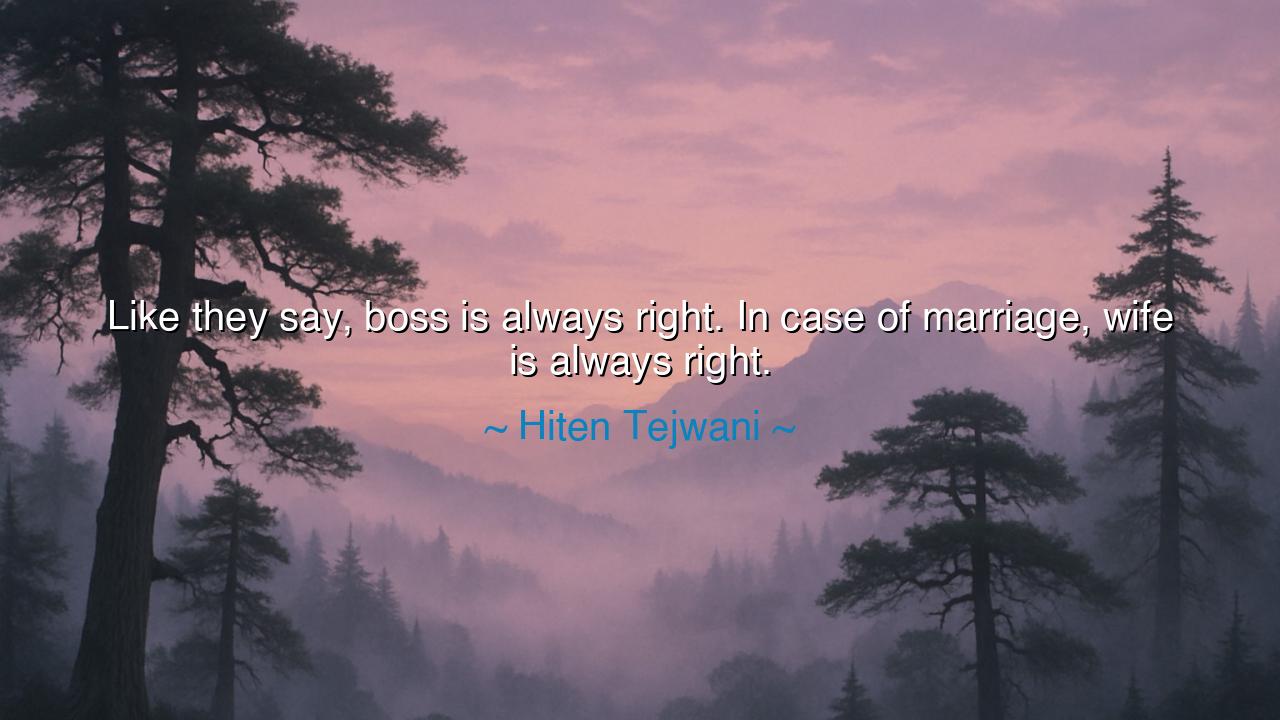
Like they say, boss is always right. In case of marriage, wife is






In the lighthearted yet profoundly wise words of Hiten Tejwani, we find a truth wrapped in laughter: “Like they say, boss is always right. In case of marriage, wife is always right.” To the unthinking ear, this may sound like a jest—a husband’s playful surrender to his wife’s authority. But to those who listen deeply, there is in this quote a reflection of harmony, humility, and understanding—the pillars upon which all enduring love is built. Through humor, Tejwani unveils a truth older than time: that peace in partnership comes not from the battle for dominance, but from the wisdom to yield, to listen, and to honor the other’s heart.
To grasp the meaning of these words, we must see beyond the surface. When he says, “the wife is always right,” Tejwani is not proclaiming the infallibility of women, but rather, the sanctity of balance within marriage. In every bond between two souls, one must learn the art of surrender—the ability to let go of pride for the sake of peace. His words teach that love is not a contest of wills, but a cooperation of hearts. Just as the boss in the workplace commands authority to maintain order, the wife in the home embodies wisdom born of care, emotion, and intuition. The phrase, half in jest, acknowledges a deeper reverence: that the feminine insight, often dismissed or underestimated, holds within it a power that sustains the fabric of family life.
The origin of such wisdom is ancient, though Tejwani gives it a modern voice. Across cultures and centuries, the sages have understood that in union—whether of marriage, friendship, or governance—success depends upon humility and respect. In the Indian tradition, the woman has long been seen as Shakti, the energy that animates creation itself. The husband, representing form, draws his strength from her spirit; without her, he is hollow, like a lamp without flame. When Tejwani speaks of the wife as “always right,” he is echoing this cosmic truth: that harmony flows not from authority, but from recognition of each other’s divinity. His jest conceals a truth the wise have known for ages—that to honor the other is not to diminish oneself, but to magnify love.
History offers us countless reflections of this insight. Consider Mahatma Gandhi and his wife Kasturba, whose marriage, though turbulent in its youth, became a model of balance and mutual respect. Gandhi, the man who moved nations, often spoke of how Kasturba’s quiet strength shaped his moral compass. Her stubbornness, her patience, her compassion—all these became the mirror through which he saw his own flaws and grew into greatness. “I learned the lesson of non-violence from my wife,” he confessed. In her firmness, he found wisdom; in her forgiveness, he found peace. Thus, Tejwani’s humor holds a timeless echo: behind every great union, there is one heart that yields not out of weakness, but out of wisdom.
In another sense, Tejwani’s words remind us of the art of humility—that gentle, invisible virtue without which no relationship can endure. To say, “You are right,” when perhaps one believes otherwise, is not an act of submission but of grace. It is the recognition that love is greater than victory. Those who cling to being “right” often win arguments but lose affection; those who let go of pride preserve both. In marriage, as in life, peace is more precious than triumph. The husband who smiles and says, “Yes, my dear, you are right,” does not diminish himself—he chooses joy over ego, laughter over conflict, unity over division.
The wisdom in this jest also speaks to balance, for just as the husband learns patience, so too must the wife temper her power with gentleness. For in truth, neither man nor woman is always right; but the one who loves first, listens first, and forgives first—that one keeps the light of marriage burning. The “wife is always right” becomes, then, not a decree, but a reminder—to cherish the perspective of one’s partner, to value her voice, and to understand that love is not about proving, but about understanding. In honoring the other, both are uplifted.
The lesson we may take is simple, yet profound: in every relationship, harmony is greater than pride. The next time discord arises, remember Tejwani’s jest and smile—not in resignation, but in recognition that love thrives on kindness, not conquest. Practice humility, not as weakness, but as wisdom; practice listening, not as obedience, but as understanding. When both hearts learn to yield to one another in turns, no storm can undo what is built upon respect.
Therefore, let these words be carried not as mere laughter, but as living truth: “In marriage, wife is always right.” For in this saying lies the secret to lasting peace—the art of choosing joy over argument, reverence over pride, and love over being correct. As the ancients would teach: the strongest man is he who bends to the will of love, and the wisest woman is she who rules with compassion. Together, they build not a battlefield, but a sanctuary—where laughter, humility, and affection reign eternal.






AAdministratorAdministrator
Welcome, honored guests. Please leave a comment, we will respond soon